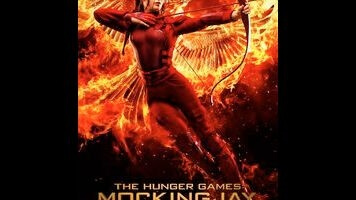
Well, that was grim. Even for the closing entry in a series about children killing children in televised death matches, The Hunger Games: Mockingjay—Part 2 goes heavy on the gloom and doom. This is a movie that begins with its main character, the anguished archer Katniss Everdeen (Jennifer Lawrence), nursing wounds inflicted by her brain-washed lover Peeta (Josh Hutcherson), and ends with someone explaining to a baby why the nightmares will never stop. Gone is the costume-ball pageantry that used to brighten the corners of Panem. Even Elizabeth Banks and Stanley Tucci, once the preening clowns of this dystopian universe, can’t crack a smile. In fact, the only real humor is of the gallows variety, provided by Donald Sutherland, injecting some crooked levity into his role as the big bad. Awash in a depressive shade of perpetual blue, Mockingjay—Part 2 out-Nolans Christopher Nolan in the race to see just how dark a PG-13 tentpole can get before the audience itself revolts.
There’s an integrity to this blanket bleakness: It would have felt false and even cowardly had Suzanne Collins chosen to complete her bestselling YA saga with an upswing of optimism, too bright of a light at the end of the tunnel. Still, plenty of casual Hunger Games fans—those without a hashtag in the Gale and Peeta contest, for instance—may miss the funhouse-mirror, reality-TV satire that enlivened all three of the previous films. Mockingjay—Part 2 is all business, its plot moving like a lit fuse, burning everything in pursuit of an apocalyptic endgame. There’s no time for outlandish talk-show appearances, backstage coaching sessions, or tweaks to the uniform. The revolution awaits.
If Part 1 suffered from a sense of anti-climax, the inevitable byproduct of adapting only half a novel, Part 2 is all climax—two hours and 17 minutes of falling action, emphasis on the action. The film practically commences mid-conversation, with unapologetic abruptness and without any “previously on” exposition. (Maybe this is for the best; anyone going to see a movie with a subtitle and a Part Two affixed to its title knows that they’re paying to see the second half of a story they’ve already started.) Tired of being the face of the rebellion, of posing for a camera while the people who idolize her die in battle, Katniss sneaks off to the frontline. Here, in an attempt to keep her poster child alive, resistance leader Alma Coin (Julianne Moore) places our heroine on an all-star brigade, whose mission is to shoot propaganda footage of their (staged) travails, not to actually lead the charge. But Katniss has other ideas, and soon the group is en route to President Snow (Sutherland), crossing an urban wasteland to put an arrow in his black heart.
This was clearly Collins’ way of getting one more Hunger Games out of her Hunger Games, of putting Katniss back in the heat of life-and-death conflict. The film turns the futuristic Capitol into a new arena, bombarding its assassination team with flame-thrower booby traps, a sticky tsunami of black tar, and subterranean monsters straight out of The Descent. The dirty secret of this franchise is that its action scenes have always been more perfunctory than exciting; the last movie didn’t hurt at all from a lack of Games. This Mockingjay expands the death-match portion of the formula to feature length, which would be less detrimental if the company were better. But beyond a few stern faces old and new (including Natalie Dormer, one of a couple castmates on loan from Westeros), the hit squad is basically just Katniss, surly boyfriend Gale (Liam Hemsworth), and work husband Peeta—though the last participant of that love-triangle at least gains a little internal conflict, the product of his reprogramming at the hands of Snow.
What a viewer wouldn’t give for more of the personality of Banks and Tucci, Woody Harrelson, or the late Philip Seymour Hoffman, all of whose supporting characters are scuttled off to the sidelines to watch and wait. Monolithic in its moroseness, Mockingjay—Part 2 bleaches some of the color (literal and figurative) out of Collins’ world. But there’s still a self-awareness—a sly subversive bent—to its blockbuster mechanics. Katniss, who just wants to die “for a cause, not a spectacle,” remains a pawn for both sides of the conflict, and the film shrewdly complicates the down-with-the-man politics of its predecessor by showing how even Coin, the supposedly righteous opposition, uses and abuses her star soldier’s celebrity. As a series, The Hunger Games is all about the manipulation of images, and this closing chapter takes that idea to its damning, logical conclusion. It also pokes a little fun at its own conventions, letting irreverent fellow Games champion Johanna Mason (Jena Malone, who deserves more screen time) denounce Katniss for her “tacky romance” and nonstop pouting. Apologies to Lawrence, whose steeliness has an appeal, but imagine what this trilogy—or fine, pentalogy—would look like with Malone’s troublemaking antiheroine at its center.
“No one who supports The Capitol is innocent,” Gale somberly insists early into the film, when Katniss expresses concern for the bystanders who might die during one of their strategic assaults. Ends justifying means, the innocence of civilians, the morality of killing those who silently, passively condone an oppressive society—seeing characters debate these topical topics is more uncomfortable this week than it would have been last week. But it’s that very willingness to wade into murky waters, however diplomatically, that puts the series a notch above the average Hollywood franchise, and helps redeem the one-note broodiness of this bifurcated finale. As The Hunger Games winds inexorably towards its downbeat conclusion, with the threat of a regime change that won’t change anything, one can’t help but feel faintly grateful for the attempt (any attempt) to tackle real problems in the context of a four-quadrant entertainment—even if, as always, Katniss solves them with little more than a well-aimed arrow.